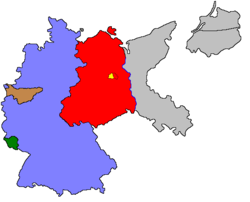International Authority for the Ruhr
| International Authority for the Ruhr | ||||||||
| International body | ||||||||
|
||||||||
|
Political borders of post-World War II Germany in 1949, with the Ruhr Area controlled by the IAR shown in brown.
|
||||||||
| Capital | Düsseldorf | |||||||
| Political structure | International organisation | |||||||
| Historical era | Cold War | |||||||
| • | London Agreement | April 28, 1949 | ||||||
| • | Treaty of Paris | April 18, 1951 | ||||||
| • | Disestablished | May 27, 1952 | ||||||
|
||||||||
| ¹ The London Agreement stipulates the location of a headquarters in North Rhine-Westphalia. | ||||||||
The International Authority for the Ruhr (IAR) was an international body established in 1949 by the Allied powers to control the coal and steel industry of the Ruhr Area in West Germany. Its seat had been in Düsseldorf.
It was agreed at meetings in London on 20 April and 2 June 1949 by the United States, United Kingdom, France and the Benelux countries. The London agreement was signed on 28 April of that year. It was abolished by the Treaty of Paris in 1951, which moved its activities to the European Coal and Steel Community (ECSC). The IAR ended its work on 27 May 1952.
The early French plans were concerned with keeping Germany weak and strengthening the French economy at the expense of that of Germany (see the Monnet Plan). French foreign policy aimed at dismantling German heavy industry, placing the coal-rich Ruhr area and Rhineland under French control or at a minimum internationalize them, and also joining the coal-rich Saarland with the iron-rich province of Lorraine (which had been handed over from Germany to France again in 1944). When American diplomats reminded the French of what a devastating effect this would have on the German economy, France's response was to suggest the Germans would just have to "make the necessary adjustments" to deal with the inevitable foreign exchange deficit.
In 1947 France removed the Saar from Germany and turned it into a protectorate under French economic control. The area returned to German administration on January 1, 1957, but France retained the right to mine from its coal mines until 1981. French plans for the complete detachment of the Ruhr from Germany met with greater resistance. In September 1946 James F. Byrnes, the United States Secretary of State stated in a Stuttgart speech Restatement of Policy on Germany that the United States would accept the French claims on the Saarland, but that: "the United States will not support any encroachment on territory which is indisputably German or any division of Germany which is not genuinely desired by the people concerned. So far as the United States is aware the people of the Ruhr area and the Rhineland desire to remain united with the rest of Germany. And the United States is not going to oppose their desire."
...
Wikipedia

